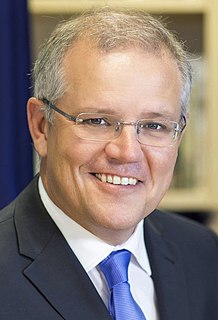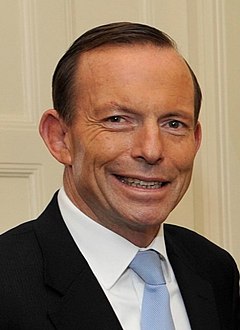
Pauline Hanson's One Nation, also known as One Nation or One Nation Party, is a political party in Australia. One Nation was founded in 1997, by member of parliament Pauline Hanson and her advisors David Ettridge and David Oldfield after Hanson was disendorsed as a federal candidate for the Liberal Party of Australia. The disendorsement came before the 1996 federal election because of comments she made about Indigenous Australians. Hanson sat as an independent for one year before forming Pauline Hanson's One Nation.

The Australian electoral system comprises the laws and processes used for the election of members of the Australian Parliament. The system presently has a number of distinctive features including compulsory enrolment, compulsory voting, majority-preferential instant-runoff voting in single-member seats to elect the lower house, the House of Representatives, and the use of the single transferable vote proportional representation system to elect the upper house, the Senate.

Electoral systems for the legislatures of the individual Australian states and territories are broadly similar to the electoral system used in federal elections in Australia.

The Nuclear Disarmament Party (NDP) was an Australian political party formed in June 1984. It was founded by medical researcher Michael Denborough as the political arm of the Australian anti-nuclear movement, which had been active since the early 1970s.

The Family First Party was a conservative political party in Australia from 2002 to 2017. It was founded in South Australia and enjoyed its greatest electoral support in that state.

A donkey vote is a ballot cast in an election that uses a preference voting system, where a voter is permitted or required to rank candidates on the ballot paper, and ranks them based on the order they appear on the ballot paper. The voter that votes in this manner is referred to as a donkey voter.
A group voting ticket (GVT) is a simplified preferential voting system previously used in federal and several Australian state elections that used the single transferable vote or the alternative vote system. Under the system, for multi-member electoral divisions, a group or party registers a GVT before an election with the electoral commission. When a voter selects a group or party “above the line” on a ballot paper, their vote is distributed according to the registered GVT for that group. The system continues to be used for the upper houses of the Australian state parliaments of Victoria and Western Australia. It has been abolished by New South Wales and South Australia. It was used in the Australian Senate from the 1984 federal election until the 2013 federal election. A form of GVT is used for some elections in Fiji.

Australian Greens SA is a green political party located in the Australian state of South Australia. It is a member of the federation of the Australian Greens party.
The Australian Country Party (ACP) is a political party based in the Australian state of Victoria. It has previously been named the Country Alliance and the Australian Country Alliance. The party is focused on rural issues, describing itself as "dedicated solely to the interests of regional communities", and was created to provide an alternative to the National Party in country Victoria.

The Liberal Democratic Party is an Australian political party founded in Canberra in 2001. The party espouses smaller government and supports policies that are based on classical liberal and right-libertarian principles. The LDP is a registered party in the Australian Capital Territory, New South Wales, South Australia, Victoria and Western Australia and is also registered for federal elections with the Australian Electoral Commission. It also has a member of the Western Australian Legislative Council, Aaron Stonehouse, two representatives in the Victorian Legislative Council, Tim Quilty and David Limbrick, and elected representatives in some local governments.

The Commonwealth Electoral Act 1918 is an Act of the Australian Parliament which continues to be the core legislation governing the conduct of elections in Australia, having been amended on numerous occasions since 1918. The Act was introduced by the Nationalist Party of Billy Hughes, the main purpose of which was to replace first-past-the-post voting with instant-runoff voting for the House of Representatives and the Senate.
4Change, formerly known as the Climate Change Coalition (CCC), was an Australian political party, which was formed in 2007 with a view to accelerate action by politicians from all parties on global warming and climate change. Its position on working towards addressing climate change, stresses cooperation with big business in order to achieve significant progress on the issue. The party therefore advocates a close working relationship between environmentalists and the business community. The CCC was registered as a political party with the Australian Electoral Commission (AEC) on 4 September 2007 and deregistered on 25 March 2010.

Sustainable Australia is an Australian political party. Formed in 2010, it describes itself as being "from the political centre".

The United Australia Party (UAP), formerly known as the Palmer United Party (PUP), is an Australian political party formed by mining magnate Clive Palmer in April 2013 and deregistered in 2017. It was revived under the original name in 2018, with ex-Pauline Hanson's One Nation senator Brian Burston representing it in parliament.

The Science Party, known as Future Party until March 2016, is an Australian political party established in 2013.

Yellow Vest Australia (YVA), until 9 April 2019 known as the Australian Liberty Alliance (ALA), is a minor political party in Australia. The party was founded by members of the Q Society and has been described as the political wing of Q Society. The board of directors is currently composed of Debbie Robinson (President), her husband Tony Robinson, Ralf Schumann (Secretary), Andrew Horwood and Susan Horwood (Treasurer).

Flux is a political movement which aims to replace the world's elected legislatures with a new system known as issue-based direct democracy (IBDD). Flux originated in and is most active in Australia, but it is also active internationally, with groups existing in the United States and Brazil.

The 2019 Australian federal election was held on Saturday 18 May 2019 to elect members of the 46th Parliament of Australia. The election had been called following the dissolution of the 45th Parliament as elected at the 2016 double dissolution federal election. All 151 seats in the House of Representatives and 40 of the 76 seats in the Senate were up for election.

















